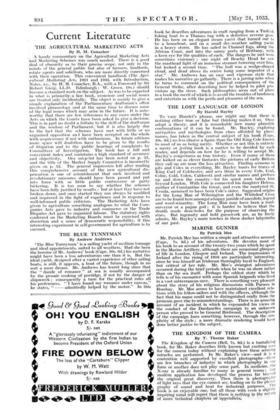THE LOST LANGUAGE OF LONDON By Harold Bayley To vary
Hamlet's phrase, one might say that there is nothing either true or false but thinking makes it so. Once adopt a theory, and it is remarkable how many plausible confirmations of it can be found. Mr. Bayley, exploring antiquities and mythologies from clues afforded by place- names, has taken as the central subject of his book- (Cape, 10s. 6d.) no less elusive a figure than the Old King Cole known to most of us as being merry. Whether or not, this is entirely a merry or jesting book is a matter to be decided by each reader, and depends on how far he is willing to accept Mr. Bayley's conjectures as true history. Even if many of them are looked on as clever fantasies the pictures of early Britain they call up are none the less attractive. Finding sermons in pits and Coles in everything, Mr. Bayley hunts for traces of King Coel of Colchester, and sees them in every Cole, Coal, Colne, Cold, Colen, Caldecott and similar names and prefixes up and down the country—for his quest soon takes him beyond London. With Cole is connected his daughter Helena, mother of Constantine the Great; and even the martyred St. Ursula, surmised to have been Cole's sister. Suggested origins for the Long Man of Wilmington and the Whiteleaf Cross are to be found here amongst a happy jumble of anecdote, legend and word-wizardry. The Long Man may • have been a road- surveyor or a pagan god ; it is harder to believe that the druids made dene-holes for the purpose of observing the stars. But ingenuity and bold guesswork are, as he freely admits, Mr. Bayley's main torches in these darker labyrinths of our past.














































 Previous page
Previous page